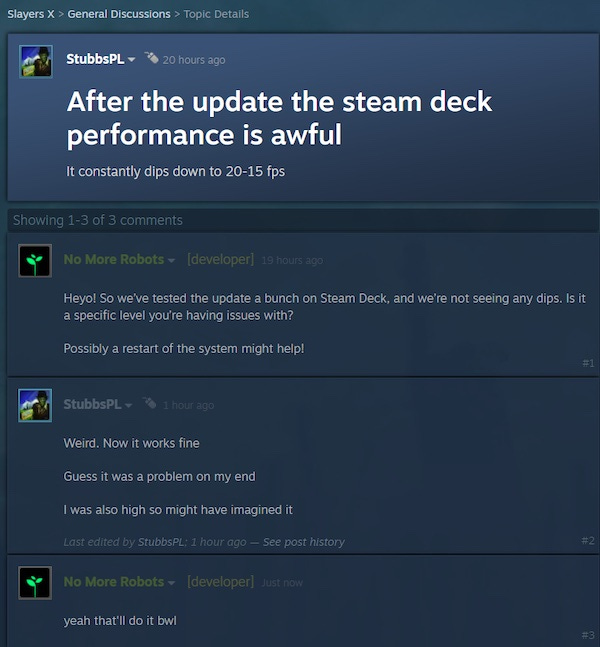Video game pitch decks: how you get them 'right'!
Also: how platforms succeed, and a waterfall of game discovery news.
[The GameDiscoverCo game discovery newsletter is written by ‘how people find your game’ expert & company founder Simon Carless, and is a regular look at how people discover and buy video games in the 2020s.]
Returned, we have. Happy to see you, we are. Yoda speak, we shall use (for the remainder of this paragraph only, luckily.) Famous Jedi Master quote, we shall mangle: ‘Discover or discover not. There is no try.’
For today’s lead story? Imagine our surprise when we found out we’d never done a dedicated newsletter about pitch decks for video games. (We’ve covered a dev’s pitch methods sometimes, but that’s it.) So let’s remedy that…
[Reminder: our new 25% off deal for our GameDiscoverCo Plus paid subscription is in effect. This includes a whole extra (big!) weekly PC/console game trend analysis newsletter, a big Steam ‘Hype’ & performance chart back-end, eBooks, a member-only Discord & more.]
Pitch decks for games: how to structure them right

Oh, c’mon, what do you even need a game pitch deck for, anyhow? You can just self-publish your game, get millions of dollars, and you never have to pitch to ‘the man’ (or woman.) Well… possibly! And self-publishing can really work out in today’s market.
But maybe you need funding to complete your game, or you don’t have any time or expertise (or money) to do comprehensive marketing, negotiate with platforms, or in general need a partner. That’s when a PC/console game pitch deck comes in.
At GameDiscoverCo, we’ve previously linked to a couple of useful pitch resources. Firstly, Raw Fury’s Developer Templates project includes a sample pitch deck and scouting analysis document. (The pitch deck is of the kind of ‘short but sweet’ structure we’d favor.)
And secondly, Glitch kindly hosts a bunch of sample ‘real’ pitch decks of varying age and relevance, as part of its Founder’s Kit. (We think the Beacon Pines, Button City 2020, and One Lonely Outpost ones are probably the most representative of modern decks.)
At GameDiscoverCo, we conservatively think we’ve seen 500+ pitch decks over the last year (!) as part of our consulting. So were delighted to see that scout & biz dev expert Gwen Foster (Viewfinder, Superhot Presents) recently posted her own, excellent pitch deck sample.
Her Google Slides overview gets to the heart of it. And we wanted to echo and promote both the deck structure & some of the points that Gwen is putting forward:
Make decks detail-heavy on ‘ask’, not game explaining: Gwen’s example really only has one or two slides specifically explaining the game/hook. This is because she’s expecting there is either a (target?) gameplay trailer, a playable vertical slice, or both. Spend time on budgets, timelines, and funds/help you need, not 15 slides on weapon types.
Studio (and individual dev) experience matters: good scouts are evangelical about researching the background of the team. What did they actually ship before, in what individual roles or as a team? Does this give confidence they can ship a game of this type? Put it in the deck, so they don’t have to go look it up..
What traction did your game (or studio) already get? Gwen has a slide on marketing which asks for Discord, Twitter, or YouTube stats for the dev. We see very few people put this in their decks - perhaps because the stats aren’t too hot? But if your studio (or this game) already got some player love, play it up!
Presenting ‘comps’ is useful, but don’t go too crazy: publishers do their own due diligence on this, so don’t worry about voluminous support documentation on what comparable games sold. But ‘what games we think we are close to, and how we think they did’ gives us a clear idea of the market you’re targeting & possible size.
We’re not claiming that all decks have to be identikit. Gwen does note: “Friendly reminder to research who you're pitching to. The decks I've built are very different, and I mostly use this template as a guide. Some people need more information and some don't. Generally this is a checklist that I use as a starting point.”
But with the supply of developers very high, and those funding games having to trawl through a sea of decks to find the most applicable to publish, fund, or feature? You want to present the most salient information succinctly. The game will be the real reason you get funded. But the right deck? It’ll speed you through the process…
How ‘a guide to platforms’ applies to game stores..
If you looked at the PC ecosystem 20 years ago, would anybody have expected Valve Corporation and Steam to be the dominant place that you bought games on a Microsoft-owned ecosystem (Windows)? Absolutely not.
Which is why it’s fascinating to read Steven Sinofsky’s 13,000 word article/book extract about his views on “patterns and practices in the creation, rise and fall of platforms”. Sinofsky used to run the Office platform and the post-Vista Windows division at Microsoft. So, as you would imagine, he’s thought about ‘platforms’ a lot.
Having said that, the article is almost entirely written in the abstract. It doesn’t talk about individual game (or other!) platforms that much. But that’s why it’s interesting to apply it - mentally - to game platforms that have succeeded.
In particular, here’s Sinosky’s comments on a subset of ‘why platforms succeed’. See if you think that they apply to platforms like Steam:
Developers developers developers: “To win with a platform, one must walk in the shoes of the target customer. That is what [Steve Ballmer] meant by repetition. The only thing that matters is to see the world as your customer does and embrace it and build for it. Check your own ego at the door and do the job of being a platform.”
Be substantial and sticky: “There’s no need to engineer sticky on purpose, which is cynical and kind of rude. Simply solve hard problems and make it easy for people to use the solution and the stickiness follows. Down the road everyone will think what you did was obvious and not all that difficult, yet no one will be able to copy your work.”
Be predictable: “To partners, once they bet on a platform the only thing that matters is predictability… First, platform engineering partners are extremely sensitive to commitments regarding features and capabilities. Second, platform business partners are extremely sensitive to commitments regarding pricing and availability. Successful platforms promise and deliver.”
When I think of why Steam has succeeded, I do think of a developer-centric attitude and messaging, (relative!) platform predictability and feature responsiveness, and particularly of being ‘sticky’ for consumers. Why? People want their games in one place that they can trust on their PC, with robust platform features* built around it.
(*Something that competitors like Epic Games Store underinvested in - for what I now suspect was philosophical reasons related to the amount of information Tim Sweeney & co wanted to retain on players - but has felt more like lack of planning at times.)
On the other hand, there’s an argument that Steam has now built an ‘economic moat’ which makes it very difficult to compete with. To some extent, it can now do as it wants, and doesn’t have to compromise on things like developer payout, Steam key rules, etc. So evaluating a company’s moat has become a popular pastime.
Sinofsky agrees that these moats exist, but says the idea of calculating moats is, uh, moot: “The general problem in using the term moat to describe platforms is that even in value investing circles, a moat is a retcon, a retroactive construction. A moat is how a business is described either after it is successful or after it was previously successful and lost share or shrank. There’s no such thing as a potential moat. A platform either has a moat or it doesn’t.”
True? Well, since Sinofsky was the person who dug Microsoft out of ‘the Windows Vista hole’, perhaps creating a bigger Windows moat in the process (metaphor mangling ahoy!), he’s, uhh, seen some stuff… so we should probably listen.
And besides platforms, a lot of actual video games are also becoming platforms (ahem, Fortnite, Minecraft, Roblox, etc) and looking to create ‘moats’. If you want to make one of those, Sinofsky’s piece might also be useful.
The game discovery news round-up..

Finishing off the free newsletters for this week (though Plus subscribers get a whole extra, cool one on Fridays!), let’s check what can only be called ‘a whole lot of news’:
Sony is following Xbox into the ‘cloud stream games from your console’ space, announcing PS5 cloud streaming plans for PS+ Premium members: “PS5 titles from the PlayStation Plus Game Catalog and Game Trials, as well as supported digital PS5 titles that players own.” When this rolls out: “As a Premium member, it’ll be easier to jump into your favorite games without downloading them first onto your PS5 console.”
And talking to GI.biz, Sony’s head of subscriptions Nick Maguire adds, re: PS+ Game Catalog portfolio strategy: “We're happy with our strategy… Putting games in [PS+] a bit later in the life cycle has meant that we can reach more customers 12, 18, 24 months after they have released.” He did note: “Occasionally, there will be an opportunity to invest in a day-and-date like Stray” - but that’s not the norm.
In ‘great discovery news’, Indie MEGABOOTH is coming back, with OG founder Kelly Wallick announcing a post-pandemic return, partly with a new crew. Plz support them for - one would presume - nicely curated exhibits of indies at B2C physical events, digital sales, grants, scholarships, and all that good stuff.
Game-specific microlinks: Axios rounds up the biggest AAA game release dates for the rest of 2023 in one handy place; the top-downloaded PlayStation games for May 2023 were headed by Star Wars Jedi: Survivor on PS5, Hogwarts Legacy on PS4, and Beat Saber on PS VR2; Europe’s top Switch eShop games for May 2023 are headed by Zelda (duh!) and Minecraft.
This Twitter thread from Summerfall’s Meredith Hall lists marketing tools that “have totally revolutionised (not kidding) how we manage content and marketing.” These are: Repurpose.io [re-using video content easily on social media]; Impress Games’s Coverage Bot [real-time media & streamer monitoring]; Robostreamer [keeping your Steam livestreams up and running.]
Microsoft and Activision soap opera update: the U.S. FTC filed to make sure MSFT and ATVI don’t merge while it’s still trying to fight the deal: “Judge Edward Davila of California’s Northern District issued a temporary restraining order… the court, however, did not decide the FTC’s additional request for a preliminary injunction, which could further pause the transaction.” (Reminder: everyone except the UK and the US is now fine with the merger.)
Microlinks, pt.2: Apple bought the AR company behind the lenses in Nintendo’s ‘Mario Kart’ ride; May’s top-grossing mobile games worldwide are headed by Honkai: Star Rail ($116.6m) and Honor Of Kings ($115.8m); Minecraft for ChromeOS leaves early access - a great idea to target the high schooler market.
Quest VR things: you can now see which apps on the main Quest VR store ‘graduated’ from App Lab; Meta is trying to re-engage users with marketing emails that reveal the MAU for certain Quest apps/games? (178,000 MAU for Virtual Desktop!); there’s unconfirmed reports on Meta’s VR game subscription service again - you’d get 2 games downloadable per month for $8?
Correction: after saying Xbox ‘cherry-picks’ stats, I misinterpreted one of those very stats! This set of announcements from Monday said “Game Pass continues to grow - our revenue from subscriptions overall reached nearly $1 billion last quarter.” (What I misread: ‘subscriptions overall’ may include Minecraft subs, Elder Scrolls Online Plus, and other MS gaming subs? Giant eyeroll on this wording.)
We don’t cover Twitch much, despite it being key for game discovery. Luckily, the latest Today Off Stream newsletter grabbed news on streamer contract changes, and documents the recent mess the platform made by “announcing a new Branded Content policy (that they walked back by the end of the day and retracted a day later).”
Esoteric microlinks: Cyan tries to explain the AI content used in Firmament - “‘AI Assisted’ does not mean wholly AI-generated”; how modders got super-odd Sega Dreamcast game Rent-A-Hero No.1 (above) working properly (and very unofficially) in English; an excellent profile trying to understand how people should ‘judge’ the charitable tactics of ridic famous YouTuber MrBeast.
Finally, our buddies at No More Robots are having typical Steam forum user problems on Slayers X. Video games - when 'i was also high’ is part of a bug report:
[We’re GameDiscoverCo, an agency based around one simple issue: how do players find, buy and enjoy your PC or console game? We run the newsletter you’re reading, and provide consulting services for publishers, funds, and other smart game industry folks.]


